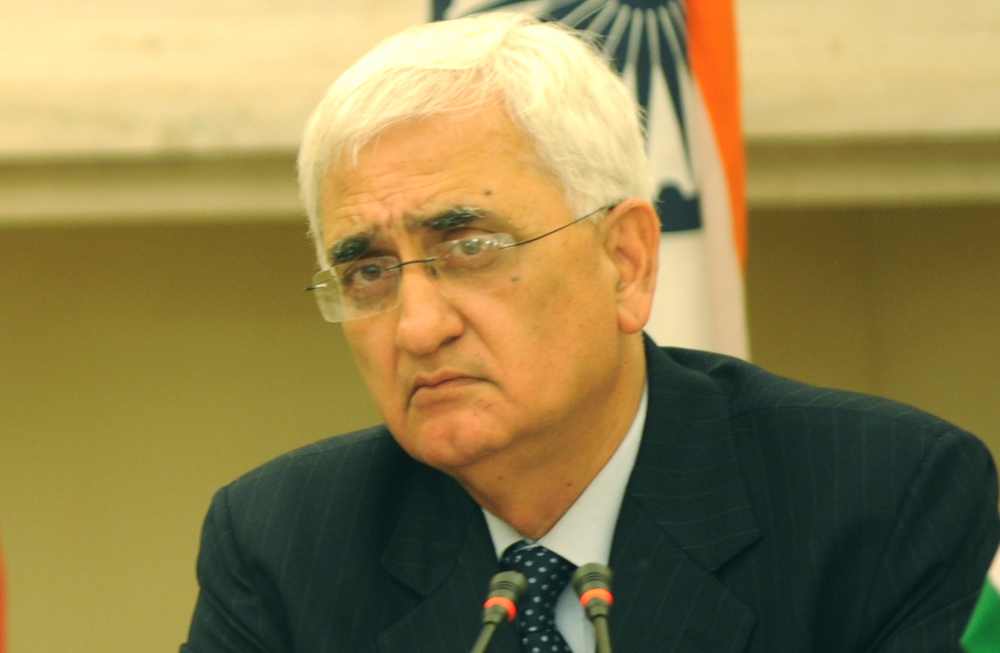Congress leader and former external affairs minister Salman Khurshid has said Nawaz Sharif was sincerely interested in peace with India and repeatedly put himself in trouble to normalise relations during his stint as Pakistan Prime Minister.
“My Indian audience would, I imagine, be concerned and disappointed that a former Indian External Affairs Minister has spoken so long without lodging a legitimate complaint about the pain and distress we continue to suffer at the hands of what is described by the Pakistan establishment as non-state actors and about whom we tirelessly provide reliable evidence of official complicity,” Khurshid writes in his latest book, Visible Muslim, Invisible Citizen: Understanding Islam in Indian Democracy.
He adds: “Let me right away publicly record my considered opinion that Pakistan’s former Prime Minister Mian Nawaz Sharif, breaking from the past, is genuinely committed to peace with India and has more than once put himself in considerable discomfort to find an opening beyond pious incantations. He made this clear during his election campaign.”
Khurshid went on to make a sensational disclosure: “He shared the information with me when, at the Commonwealth Conference in Sri Lanka, he took me aside for a coffee. ‘My advisers said saying that would be fatal,’ Nawaz Sharif told me, ‘but I said I do not want to win by misleading my people. The young of Pakistan want the life of their Indian counterparts. The past is past’.”
Asked to elaborate, Khurshid told The Telegraph: “I was representing India because Prime Minister Manmohan Singh chose not to go because of certain issues with Sri Lanka at that time.”
Khurshid added: “Sharif took me aside and said ‘these routine talks will continue at the conference, let’s discuss something serious’. Then he said what I have written. I have no doubt he wanted to normalise the relations. That was brave. But that time has passed and events have overtaken.… The poor man is in prison now.”
Pakistan has always been an issue in Indian elections, more than what India has been in the elections in the neighbourhood.
Pakistan might have altered the course of the latest parliamentary election when Prime Minister Narendra Modi built his entire campaign on the air strikes in Balakot after the Pulwama massacre. Modi’s “ghar mein ghus kar marenge” was the dominating feature of the electoral discourse that almost crushed the bread-and-butter questions raised by the Opposition.
Asked if any Indian Prime Minister can run the risk of saying in elections that he would ensure good relations with Pakistan, Khurshid said: “I don’t know. That depends on circumstances. That’s certainly not possible today. But remember what Sharif told me was before Modi’s overtures of inviting him to the oath-taking ceremony and making that unscheduled visit to Pakistan.”

Salman Khurshid (Wikimedia Commons)
Sharif had sprung a surprise by unambiguously stating in the election campaign of 2018 that he wanted good relations with India. He also appeared determined to dismantle the terror infrastructure on Pakistani soil.
In an interview with the Dawn newspaper, Sharif went to the extent of saying: “Militant organisations are active. Call them non-state actors, should we allow them to cross the border and kill 150 people in Mumbai? Explain it to me. Why can’t we complete the trial?”
This might have infuriated the Pakistani deep state and Sharif was called “Modi ka yaar”, “traitor” and a “security risk”. Slogans like “Modi ka jo yaar hai/gaddar hai” appeared and the military establishment explicitly supported Imran Khan’s Tehreek-e-Insaf.
On Pakistani social media, Sharif was almost disqualified as a leader who could rule the country. Images of Modi being received by him on an unscheduled visit were circulated as evidence of his pro-India politics.
Ironically, Imran sang a different tune after becoming Prime Minister and hailed Sharif for trying to improve Indo-Pak relations.
Imran himself expressed his desire to normalise relations and blamed Modi’s aggressive anti-Pakistan policy for the stalemate.
In the book, Khurshid goes beyond the usual acerbic rhetoric about the hostile neighbour and writes: “India has a stake in the success of Pakistan far greater than any sustained usefulness of a counter-argument against its initial conception. History has long bypassed the latter while realpolitik points to the former as an imperative. A successful Pakistan would have less reason to search for a unifying external object of hostility, and it is equally true that a successful India must break free of its convenient obsession with a toxic Pakistan to overcome the Indo-Pak hyphen of international approach to the subcontinent.”
He further writes: “It is curious that most seeming breakthroughs between India and Pakistan take place when the Pakistani army is in direct control of the government machinery in Islamabad. To think that the very institution whose stated raison d’etre is to protect Pakistan from real or imagined threats from India, among other objectives, should also be the instrument of better understanding and relations is ironic in the extreme.
“The political schizophrenia is explained by the dire need for an identified enemy to rally the nation for a common cause when not in government and display virtuosity in pulling off diplomatic successes when in government.”











